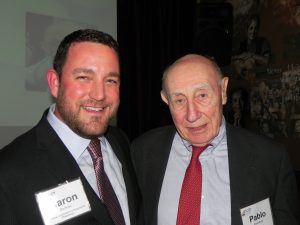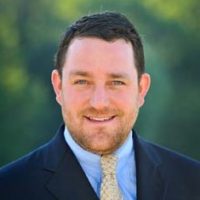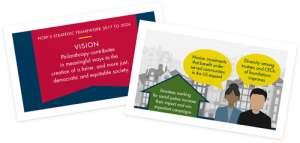For nearly five decades, NCRP’s mission has been to transform the philanthropic sector to one where funders build, share, and wield power in allyship with domestic social justice movements. Those social movements and the larger communities that we all serve are hurting.
We have all been horrified by the escalating violence that has killed thousands of Israeli and Palestinian civilians, the vast majority of them women, children, and families. While Israelis mourn their dead and wait for the fate of the hostages taken by Hamas, in Gaza more than 2 million Palestinians are being subjected to a brutal retaliatory campaign of collective punishment by the Netanyahu government.
Here at home, the violence in the Middle East is fueling increased attacks against Arab, Jewish, and Muslim neighbors in U.S. cities and towns. The corresponding multiple-fold spike in domestic antisemitic and Islamophobic hate incidents, fueled by opportunistic white nationalist rhetoric and action, have placed these communities under attack and caused a tremendous amount of pain and fear. The conflict has also been triggering other communities who live or have come to live in this country fleeing abuse, militarism, authoritarianism and other forms of state-sponsored violence.
Some in philanthropy are even allowing the far right to use this conflict as a wedge between and among progressive movements and progressive funders. We are deeply disturbed at reports of threats to defund groups in the U.S. that have stood up for peace, called for a ceasefire, labeled the conflict genocide, or otherwise spoken out against the mass bombing that Israel’s ultra-right-wing government is carrying out in Gaza. Nonprofit and movement allies from organizers in migrant justice and abortion access to climate justice groups have told us that several funders are threatening current or future resources for real or perceived criticism of Israel’s and/or the United States’ role in the devastating humanitarian crisis in Gaza. While some movement groups have spoken out against such financial intimidation, not every non-profit has the autonomy or the financial resilience to do so.
Nor should they have to.
These threats reflect an abuse of funder power and are antithetical to a vision of partnership and mutual respect between donors and grantees. Weaponizing access to funding creates a chilling effect on nonprofits’ speech and agency and represents the worst impulses of funders to wield destructive power to control grantees as opposed to engaging with them as equals. It’s a major reason why the philanthropic sector as a whole struggles to consistently build trust with many impacted communities. We must all be aware of the long-term consequences of our actions; relationships that we sever now will not be easily rebuilt.
All of us in philanthropy need to engage in hard conversations as we commit to responding to events in ways that move us towards a just and peaceful world. Jewish and Palestinian safety and liberation are inextricably intertwined, not mutually exclusive, commitments. Rather than choosing inaction, censorship, or retaliation, funders should take this opportunity to deepen dialogue with grantees and with communities under threat.
In this spirit, NCRP calls on funders to:
1) Stop threats or actions to defund groups based on their public statements around Israel/Palestine and instead focus on resources and relationship-building to strengthen, not fracture, domestic social justice movements. Now is the time to double down on supporting movements for equity and justice.
2) Provide rapid response funding to ensure Arab, Jewish, and Muslim communities in the US receive the resources needed right now for immediate safety.
3) Invest in the long-term work of confronting and defeating the agenda of domestic white nationalist hate groups. That could mean providing multi-year, unrestricted grants for leaders in impacted communities and those groups working directly on these issues.
4) Support groups that are pushing back against interpersonal and state-sponsored violence that so many Americans are facing. There is a reason why violence abroad is touching so many at home. Let’s fund more work that unearths and disrupts the connection between easily denounceable movements like white nationalism, antisemitism, Islamophobia and anti-trans/LGBT legislation with the more “socially acceptable” challenges to civil rights, immigration abortion, and bodily autonomy.
The strategy of mining our differences to keep our communities divided is not a new one and has succeeded in the past. We know that if it happens again, there will be devastating consequences for the trust, collaboration, and solidarity required between funders and movements that is needed to restore our democracy and defeat white supremacy here at home.
Everyone deserves to live in a world where economic, social, and political security is a reality for all, not a select few. Philanthropy has a strong civic, economic, and moral obligation to help make that happen by resourcing a more inclusive and equitable future.
There is no doubt that philanthropy has power. We call on grantmakers to use that power with wisdom and in solidarity. Let us not spread more fear and harm movements with the threat of scarcity. Instead, let’s act in the service of a shared vision of justice by doing the hard work of building relationships with grantees based on dialogue, trust, and respect.
Aaron Dorfman is the President & CEO of the National Committee for Responsive Philanthropy.

 I had known of Pablo for many years before I actually met him. When I was a young organizer working for ACORN, I knew about Pablo and his incredible work at the Center for Community Change. As a student at what is now the Lilly Family School of Philanthropy at Indiana University, I had read his writings about philanthropy. But I had never met him in person.
I had known of Pablo for many years before I actually met him. When I was a young organizer working for ACORN, I knew about Pablo and his incredible work at the Center for Community Change. As a student at what is now the Lilly Family School of Philanthropy at Indiana University, I had read his writings about philanthropy. But I had never met him in person. Our work together is more important than ever. Over the Thanksgiving holiday, I found myself reflecting about how grateful I am for all of you, staff, volunteers and trustees for an amazing web of nonprofits and foundations. I know this to be true: Philanthropy has a vitally important role to play in building a more just, fair and democratic world.
Our work together is more important than ever. Over the Thanksgiving holiday, I found myself reflecting about how grateful I am for all of you, staff, volunteers and trustees for an amazing web of nonprofits and foundations. I know this to be true: Philanthropy has a vitally important role to play in building a more just, fair and democratic world.